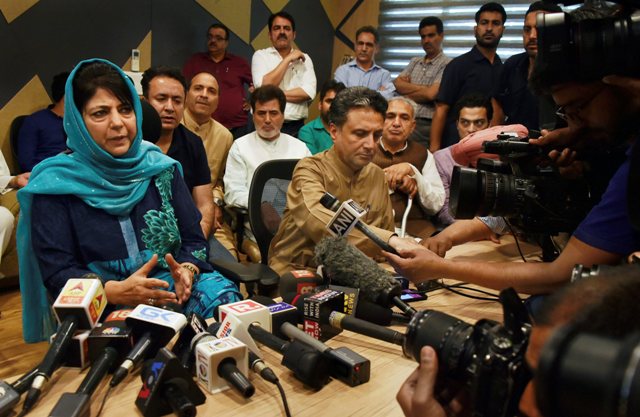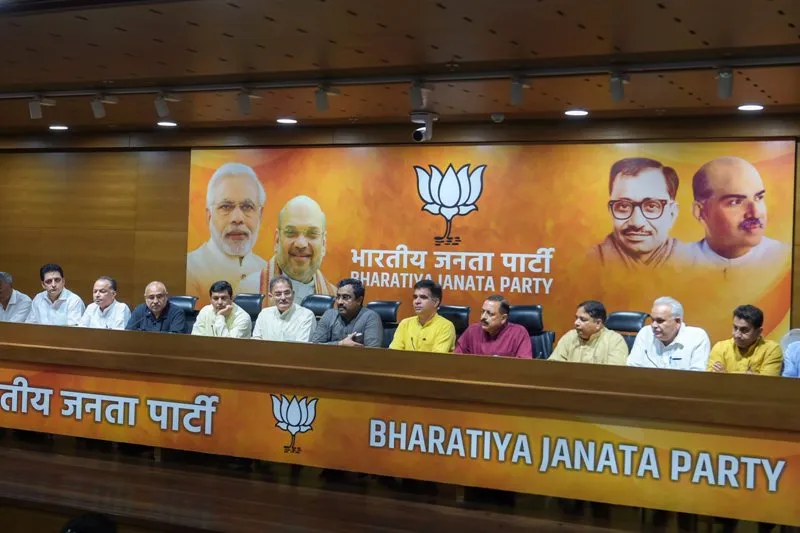The collapse of the Bharatiya Janata Party-People’s Democratic Party (PDP) alliance following the BJP’s decision to pull out of the coalition government was not entirely unexpected.
The two were unlikely allies to start with — one a hard nationalist party and the other often termed “soft separatist” by the BJP during the 2014 election campaign for the state assembly – and the fact that the “Agenda for Alliance” they negotiated as the basic text of their government remained unimplemented was further proof of their incompatibility. And yet, we should be clear about one thing — the BJP’s decision to withdraw from the coalition, announced at a press conference by Ram Madhav on Tuesday afternoon — is nothing less than an abdication of political responsibility on the part of the party.
The two were unlikely allies to start with — one a hard nationalist party and the other often termed “soft separatist” by the BJP during the 2014 election campaign for the state assembly – and the fact that the “Agenda for Alliance” they negotiated as the basic text of their government remained unimplemented was further proof of their incompatibility.
Since 2000, when by all accounts truly free and fair elections have taken place in the state, governments in Jammu and Kashmir have always been coalitions between New Delhi and Srinagar. This was the natural outcome of the security situation in the state, where the Union government wielded huge authority through the office of the governor and the central forces — the Army and the Central paramilitary forces (CPMFs).
Despite the Union government’s monofocal approach emphasising the unrelenting use of force and its refusal to make any significant political gesture towards resolving the political issues underlying the state’s problems, these coalitions had provided some sort of stability in the state.
In the 2002 elections, the National Conference led by Farooq Abdullah saw its seats come down from 57 in a house of 87 to 28. The Congress saw their seat share rise from 7 to 20. But most significant was the rise of Mufti Mohammed Sayeed’s People’s Democratic Party, which got 16. That year, the BJP won just one seat, down from the eight it had held earlier. One reason for this was a split in the party and the formation of the Jammu Mukti Morcha, an RSS-backed body, that called for trifurcation of the state. Eventually a coalition of the Congress and PDP took office, with the Mufti becoming chief minister for a three year period till 2005, and then handing over office to Ghulam Nabi Azad of the Congress, who became the first chief minister of his party in the state since Syed Mir Qasim in 1975.
Despite the Union government’s monofocal approach emphasising the unrelenting use of force and its refusal to make any significant political gesture towards resolving the political issues underlying the state’s problems, these coalitions had provided some sort of stability in the state.
In 2008, in the wake of enormous public violence arising out of the Amarnath land agitation, the National Conference got 28 seats, the number it held earlier, and while the PDP’s tally went up from 16 to 21, the Congress came down three seats to 17. The big gainer was the BJP, whose tally went up to 11. An NC-Congress coalition government was formed under the leadership of Omar Abdullah.
The 2014 state assembly elections took place in the wake of the BJP’s spectacular performance in the Lok Sabha elections. Not surprisingly, the NC-Congress alliance had come apart before the elections. The BJP ran a hard campaign seeking to capitalise on its win in the Lok Sabha polls, terming its goal “Mission 44”, the number of seats needed to get a majority in the 87 member J&K Assembly.
The elections came up with surprises for everyone. What Mission 44 did was to push some boycotters to participate in the elections out of fear of the BJP. The result was higher polling percentages in the urban constituencies of the Valley which were prone to de-facto boycotts. The overall turnout of 66% was the highest ever recorded.
The PDP, that had expected to come close to 35 or so, ended up with only 28. The BJP’s tally went up to 25, thanks to the Jammu region, largely at the expense of the Congress. The NC, which was expecting a washout, actually managed to get 15 seats and the Congress 12. Ironically, the Congress was the only party that won seats in the Valley, Jammu and Ladakh sub-regions of the state. While the BJP swept the Jammu region, it drew a blank in the Valley and Ladakh. On their part, the NC and PDP failed to get a presence south of the Pir Panjal.
While Mehbooba Mufti must bear her share of the blame, the BJP’s failure has been in its refusal to treat the Kashmir problem as a political problem.
Mufti Sayeed managed to make this unlikely coalition work for the 10 months that he was there as chief minister before he passed away in January 2016. His successor, Mehbooba Mufti, delayed her entry into office till April, in part because she was aware of the growing disquiet within PDP ranks relating to the coalition. The succeeding two years have seen the unravelling of the coalition as well as the coherence of the state government.
 Chief Minister Mehbooba Mufti addressing a press conference in Srinagar, 19 June. | Source: PTI
Chief Minister Mehbooba Mufti addressing a press conference in Srinagar, 19 June. | Source: PTI
While Mehbooba must bear her share of the blame, the BJP’s failure has been in its refusal to treat the Kashmir problem as a political problem. From day one, its approach has been to treat it solely as a law and order issue. True, it put up former Intelligence Bureau director Dineshwar Sharma as an interlocutor, but he was saddled with so many qualifications that his task became meaningless. As for the Ramzan ceasefire, it was too short and too late.
A major reason for the BJP’s latest posture is that it has nothing to offer by way of a political dialogue, because it does not believe that autonomy is an issue. Actually, it believes that J&K deserves less autonomy than it has at present. To compound this is its messy Pakistan policy which has lurched from Modi descending on Lahore to wish Nawaz Sharif for his birthday, to ordering disproportionately heavy artillery barrages along the LoC. Instead of engagement, all we have seen with regard to Islamabad in recent years is a lot of global posturing on the need to fight terrorism.
Since the BJP runs the Union government at the Centre, it had a special responsibility for the state. For this reason, its participation in the coalition in Srinagar was a good thing. Now that it has pulled out, one this clear: From partial responsibility, the BJP now has full responsibility for the affairs of the state. But the big question here is: Does the party have anything more in mind than a straightforward military operation in the Valley? Or does it want to use Kashmir as part of its election strategy for the next Lok Sabha elections?
As things stand, the state could well be headed for an even greater tragedy than the one it has been afflicted by in the past 30 years.
This commentary originally appeared in The Wire.
The views expressed above belong to the author(s). ORF research and analyses now available on Telegram! Click here to access our curated content — blogs, longforms and interviews.




 Chief Minister Mehbooba Mufti addressing a press conference in Srinagar, 19 June. | Source: PTI
Chief Minister Mehbooba Mufti addressing a press conference in Srinagar, 19 June. | Source: PTI PREV
PREV


